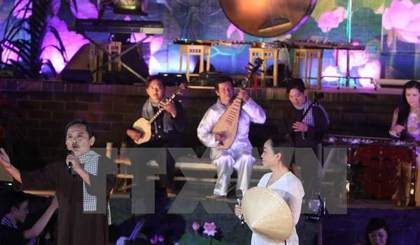Website for second "Don Ca Tai Tu" festival launched
Activities and information related to “Don Ca Tai Tu”, the musical art that UNESCO recognised as an intangible cultural heritage in 2013, will be available at http://doncataitu.vn launched in the southern province of Binh Duong.
According to Lai Xuan Thanh, Director of the provincial Department of Culture, Sports and Tourism, the website will update official information about the second national festival of “Don Ca Tai Tu” – Binh Duong 2017 provided by the organisation board.
Other relevant information and services will also be offered on the website, including artists, sponsors, volunteers, documents and maps.
 |
| "Don ca tai tu"performance (Photo: VNA) |
The festival will take place in new Binh Duong city from April 8-12 with the participation of representatives from 21 provinces and cities in the south.
The event will feature traditional art performances, and workshops on the art genre and local tourism development.
The first national “Don Ca Tai Tu” festival was organised in the southern province of Bac Lieu in 2014.
Known as a musical art that has both scholarly and folk roots, Don Ca Tai Tu was developed in southern Vietnam in the late 19th century. The impromptu art honours the creativeness and artistry of the performers.
The art is performed at numerous events, such as festivals, ‘death anniversary' rituals, and celebratory social events. The audience can join in, by practicing, making comments or creating new words for songs.
It has been transmitted from generation to generation through official and unofficial forms of education in all 21 provinces, where the art form is popular. Don Ca Tai Tu has continually been popularised through cultural exchanges among peoples, presenting their mutual harmony and respect.
The art form is played on a variety of different instruments, including the kim (moon-shaped lute), co (two-stringed fiddle), tranh (16-string zither), ty ba (pear-shaped lute), song lang (percussion), bau (monochord) and sao (bamboo flute), and the violin and guitar, which were adapted.
The musicians who contribute to Don Ca Tai Tu include master instrumentalists, master lyricists, master singers, instrumentalists, and singers.
Influenced by other forms of cultural heritage from the central and southern regions of Vietnam, such as nhac le (ceremonial music) and hat boi (classical theatre and folk song), the music genre was added to the National List of Intangible Cultural Heritage in 2012.
(Source: VNA)
.
 về đầu trang
về đầu trang







